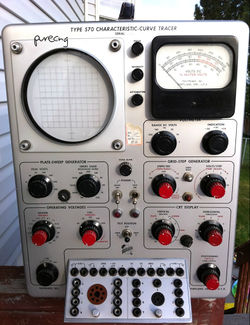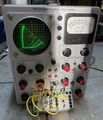570: Difference between revisions
No edit summary |
No edit summary |
||
| Line 27: | Line 27: | ||
Plate current is measured and amplified and is applied to the Y-axis of the display. | Plate current is measured and amplified and is applied to the Y-axis of the display. | ||
[[John Kobbe]] had a key role in the development of both the 570 and [[575]] curve tracers. | [[John Kobbe]] had a key role in the development of both the 570 and [[575]] curve tracers: | ||
<blockquote> | |||
While I was working on the [[541|540 series]] vertical amplifier, [[Virgil Briton]], whose bench was next to me, had put together a vacuum tube curve tracer using stepping relays and other mechanical devices. I remember thinking that, that was a neat display even if it did a lot clicking and was slow. After putting the cross hatch generator together, I knew it would be very easy to do the curve tracer electronically,it started for in house use,but after putting a self-contained instrument together, Tek decided to call it 570 and sell it. | |||
</blockquote> | |||
{{MissingSpecs}} | {{MissingSpecs}} | ||
Revision as of 15:17, 13 August 2023
The Tektronix 570 was Tek's first curve tracer, introduced in 1955. It is a curve tracer for vacuum tubes. It sweeps the plate voltage between zero and a selectable maximum voltage while "stepping" the control grid through a set of voltages.
A selectable screen voltage is available for testing tubes with screens. The plate voltage is measured and applied to the X-axis of the display. Plate current is measured and amplified and is applied to the Y-axis of the display.
John Kobbe had a key role in the development of both the 570 and 575 curve tracers:
While I was working on the 540 series vertical amplifier, Virgil Briton, whose bench was next to me, had put together a vacuum tube curve tracer using stepping relays and other mechanical devices. I remember thinking that, that was a neat display even if it did a lot clicking and was slow. After putting the cross hatch generator together, I knew it would be very easy to do the curve tracer electronically,it started for in house use,but after putting a self-contained instrument together, Tek decided to call it 570 and sell it.
Key Specifications
- please add
Internals
The 570 contains five transformers:
- T310: center-tapped isolation transformer for plate sweep
- T340: multitap transformer for heater voltages
- T401: multitap autotransformer for selecting peak plate voltage, feeds T310
- T501: transformer for floating supplies and screen voltage supply
- T620: transformer for 60 kHz HV power oscillator for CRT voltages
The screen supply is regulated and uses a 6CD6GA tube as the series regulator.
The vertical and horizontal amplifiers are almost identical. The first stage is a differential amplifier made of two 6AU6 tubes. The second stage is a differential amplifier made of both halves of a 6BQ7A.
A T52P1 CRT is standard in the 570.
Links
Pictures
Early Tektronix 570 (Brown Era)
Tektronix 570 Serial Number 5010
Tektronix 570 Serial Number 5055
Tektronix 570 Serial Number 5148
Tektronix 570 Serial Number 5429
Adaptors for Different Tube Bases
-
12-pin adaptor
-
12-pin adaptor
-
7-pin miniature adaptor
-
7-pin miniature adaptor
-














































